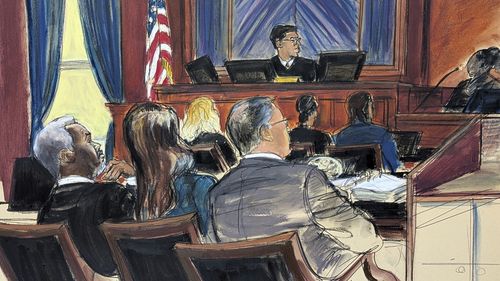Share this @internewscast.com
Sean “Diddy” Combs was not singled out by prosecutors due to his race, according to a judge’s decision on Friday. This decision came as the judge denied a motion to dismiss certain charges just days before the commencement of the hip-hop icon’s trial on racketeering and sex trafficking accusations.
In a separate written opinion, the judge also refused to suppress evidence in the case.

Judge Arun Subramanian declared that Combs had failed to provide evidence of racial bias, either in effect or intent, when his legal team presented their case in Manhattan federal court in February.
Combs’ attorneys argued that the prosecution was unparalleled, claiming that “no white individual had ever faced similar charges.” The judge sided with the prosecution, who highlighted the criminal actions attributed to Combs between 2004 and 2024—alleging he led a racketeering operation facilitating sexual exploitation of women—distinguishing his case from others.
âIt’s the severity of what Combs allegedly did â not his race â that mattered,â the judge wrote.
Subramanian noted that lawyers for Combs had alleged that the government sought to humiliate him through its news releases, the way search warrants were executed at his home, the refusal to let him surrender and alleged leaks to the media.
âHowever, Combs doesnât point to any evidence that racial bias played a role in the Governmentâs actions, that the prosecution team was responsible for any leaks to the press, or that the way Combsâs homes were searched bespeaks a discriminatory purpose,â the judge wrote.

He added that the government’s press releases and refusal to allow Combs to self-surrender were in keeping with how it has handled cases with defendants of other races.
The ruling came as opening statements were scheduled to occur Monday immediately after the final stage of jury selection, which defense lawyers say will take only a matter of minutes.
Prosecutors allege that Combs, 55, used his fame and power at the top of the hip-hop world to sexually abuse women from 2004 to 2024.
He pleaded not guilty after his September arrest and has been held without bail at a Brooklyn federal lockup.
At a hearing Friday, Subramanian cancelled plans to finish picking the jury for the trial, saying he was worried that some jurors might get âcold feetâ and back out of the case by Monday if they had the weekend to think about it.
One juror who sent an email to the court’s jury department on Thursday night expressing concern about her âwell-beingâ was dismissed from the panel of 45 jurors, from which 12 jurors and six alternates will be chosen on Monday.
Combs was in the Manhattan courtroom on Friday, but jurors werenât required to be there. The trial is projected to last two months.

Would-be jurors were asked questions earlier in the week to help the judge and lawyers determine if they could be fair and impartial.
And they were also questioned to ensure they could decide the case on the facts â even after seeing explicit videos of sexual activity that some might find disturbing.
If Combs is convicted on all charges â which include racketeering, kidnapping, arson, bribery and sex trafficking â he would face a mandatory 15 years in prison and could remain behind bars for life.
An indictment includes descriptions of âFreak Offs”, drugged-up orgies in which women were forced to have sex with male sex workers while Combs filmed them.
The charges against him also portray Combs as abusive to his victims, sometimes choking, hitting, kicking and dragging them, often by the hair.
Once, the indictment alleges, he even dangled someone from a balcony.

His lawyers say prosecutors are trying to criminalise sexual activity between consenting adults.
They concede that Combs had abused various substances but say he has since undergone treatment.
A centerpiece of the evidence against him are recordings of Combs beating a longtime girlfriend in a Los Angeles hotel hallway in 2016.
After a video of the encounter aired on CNN last year, Combs apologized, saying, âI take full responsibility for my actions in that video. I was disgusted then when I did it. Iâm disgusted now.â
Numerous prospective jurors told the judge they’d seen the video and some were deemed too affected by it to be impartial.










